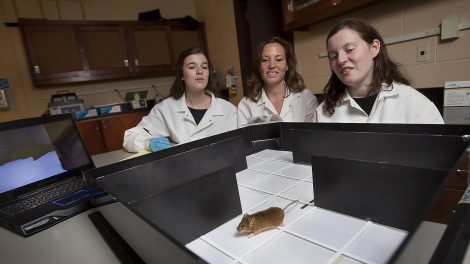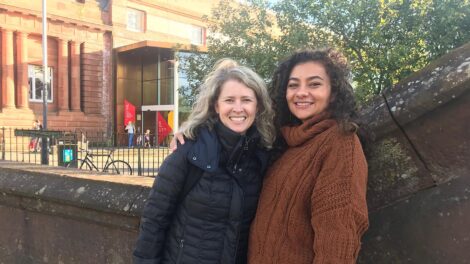Meaningful Mentorship: Karla Cariño ’21 and Prof. Lisa Gabel
By Shannon Sigafoos
Recent grad Karla Cariño ’21 and Lisa Gabel, professor and department head of neuroscience, share how working together on a tool to detect reading impairments in children changed Cariño’s Lafayette experience—and her future.
The Student: “I had not had a class with Prof. Gabel during my first year, and then during my sophomore year, I met with her and ended up opening up to her about how I was an undocumented student and didn’t have a Social Security number to apply for funding for research programs. She told me about her dyslexia study and that they worked with a lot of young children. I started in her lab that spring,” says Cariño, who majored in neuroscience.
The Mentor: Lisa Gabel joined the Department of Psychology and Program in Neuroscience at Lafayette College in 2006. Work in her laboratory focuses on behavioral and neurophysiological consequences of neurodevelopmental disorders. For the past six years, lab students have examined the interaction between dyslexia susceptibility genes, maze learning behavior, and reading toward the early identification of a reading disorder.
“Students often stay in the lab for a couple of years. The longer they stay, the more involved they get in a project. Karla was involved with the lab for several years and was able to step into a leadership role on this study.”

Prof. Lisa Gabel helps Karla Cariño ’21 get ready for Commencement.
Becoming Co-Authors: The manuscript that Gabel and her co-authors—including Cariño ’21—wrote as a result of that study was accepted for publication in Developmental Neuroscience.
“I remember when she told me, ‘You’re going to be a published author.’ And at the time I thought, ‘Oh my goodness, I’m going to be a published author!’ That’s pretty cool, and it felt like the things that I did that summer actually meant something,” says Cariño. “Because of my situation, I wasn’t able to be compensated, and it was all volunteer work. It’s going to help me a lot with networking in the future.”
“Karla was always raring to go. She definitely made the most of her Lafayette experience. She was so engaged and motivated with this project,” says Gabel. “Students at Lafayette are often involved in a number of campus activities, but despite the constraints on her time, Karla always went above and beyond.”
Changing One Student’s Future: “As a result of her involvement in this project, Karla became interested in determining whether the tool we developed would be able to identify dyslexia in children who are deaf American Sign Language (ASL) users. Once a student becomes invested in a project, and understands the current state of the field, they begin to identify questions they are interested in addressing, and design their own projects. Based on her interests, Karla decided to focus her final paper on how our maze task could be used as a way to assess reading ability in ASL users. Although Karla has graduated, she has made a lasting impact on our research program.”
“I’m super grateful to her for teaching me so much, and I had so many questions. I remember when we were analyzing data sheets, she said it was good that I kept asking questions instead of just nodding and saying I understood everything. There were a lot of things I didn’t know, and that was OK,” says Cariño. “I think my involvement with her lab and with the publication will open a lot of doors for new opportunities.”

What’s Next: “My future is still in the discovery phase,” says Cariño. “I very much want to work with children, and I want to be an advocate for children. I’m thinking of taking a gap year and either applying for medical school to be a pediatrician, or applying to a graduate program where I could study to be a therapist for children.”

